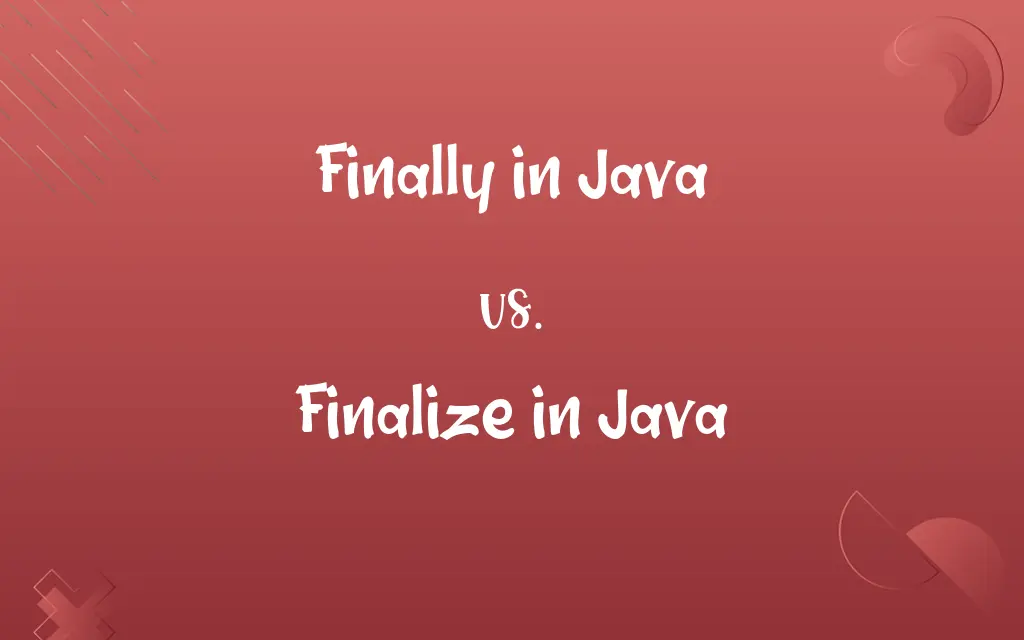Finally in Java vs. Finalize in Java: Know the Difference

By Shumaila Saeed || Published on February 13, 2024
Finally in Java is a block that executes after a try-catch block, ensuring code execution regardless of exceptions; Finalize is a method used for cleanup before garbage collection.

Key Differences
Finally in Java is a block that always executes after try and catch blocks, ensuring that certain essential code runs regardless of whether an exception occurred or not. Finalize in Java, on the other hand, is a method that the garbage collector calls on an object just before reclaiming its memory, providing a chance to perform cleanup activities.
Shumaila Saeed
Feb 13, 2024
The finally block is part of Java's exception handling mechanism. It's used to close resources like files or database connections, ensuring these resources are released even if an exception is thrown. Conversely, the finalize method is part of Java's garbage collection process. It allows an object to free up resources or perform other cleanup before the object is garbage collected.
Shumaila Saeed
Feb 13, 2024
Finally blocks provide a guarantee of execution, making them reliable for resource management. This reliability is not present in finalize, as the timing of garbage collection and finalize method invocation is uncertain and controlled by the JVM's garbage collector.
Shumaila Saeed
Feb 13, 2024
The use of finally is generally recommended over using finalize for resource management. This is because finally provides deterministic behavior and executes regardless of whether the try block completes normally or abruptly. Finalize, however, can be unpredictable and should not be relied upon for essential cleanup.
Shumaila Saeed
Feb 13, 2024
Finally blocks do not require any special method or class. They are simply part of the try-catch structure in Java. In contrast, finalize is a protected method of the Object class, which can be overridden by subclasses to implement cleanup logic.
Shumaila Saeed
Feb 13, 2024
ADVERTISEMENT
Comparison Chart
Purpose
Ensures code execution after try-catch, regardless of exceptions
Invoked by GC for cleanup before object is reclaimed
Shumaila Saeed
Feb 13, 2024
Usage
Used for resource management (e.g., closing files)
Used for cleanup before garbage collection
Shumaila Saeed
Feb 13, 2024
ADVERTISEMENT
Finally in Java and Finalize in Java Definitions
Finally in Java
A block that executes after try-catch to ensure code execution.
Try { file.open(); } catch (Exception e) { } finally { file.close(); }
Shumaila Saeed
Jan 23, 2024
Finalize in Java
Overridden from Object class for custom cleanup.
Protected void finalize() { clearCache(); }
Shumaila Saeed
Jan 23, 2024
Finally in Java
Executes whether or not an exception is caught.
Try { loadData(); } catch (IOException e) { } finally { clearResources(); }
Shumaila Saeed
Jan 23, 2024
Finalize in Java
Unpredictable in execution, not recommended for essential cleanup.
Protected void finalize() { closeNativeHandle(); }
Shumaila Saeed
Jan 23, 2024
Finally in Java
A mechanism to guarantee the execution of important code segments.
Try { processData(); } finally { cleanupData(); }
Shumaila Saeed
Jan 23, 2024
ADVERTISEMENT
Finalize in Java
Part of the garbage collection mechanism in Java.
Protected void finalize() { freeMemory(); }
Shumaila Saeed
Jan 23, 2024
Finally in Java
Used for resource management, releasing resources irrespective of exception occurrence.
Try { connection.connect(); } finally { connection.disconnect(); }
Shumaila Saeed
Jan 23, 2024
Finalize in Java
Used to perform cleanup activities before garbage collection.
Protected void finalize() { disconnect(); }
Shumaila Saeed
Jan 23, 2024
Finally in Java
Integral part of Java's exception handling, providing a clean-up block.
Try { openFile(); } catch (FileNotFoundException e) { } finally { closeFile(); }
Shumaila Saeed
Jan 23, 2024
Finalize in Java
A method called by the garbage collector before object memory is reclaimed.
Protected void finalize() { releaseResources(); }
Shumaila Saeed
Jan 23, 2024
Repeatedly Asked Queries
When is finalize called in Java?
It's called by the garbage collector before an object is garbage collected.
Shumaila Saeed
Feb 13, 2024
Can we rely on finalize for important cleanup activities?
No, finalize has unpredictable execution and shouldn't be used for essential cleanup.
Shumaila Saeed
Feb 13, 2024
What happens if an exception occurs in a finally block?
The exception propagates out of the finally block, potentially overriding any exception thrown in the try block.
Shumaila Saeed
Feb 13, 2024
What is the purpose of finally in Java?
It ensures code execution after a try-catch block, regardless of exceptions.
Shumaila Saeed
Feb 13, 2024
Can we force the garbage collector to call finalize?
No, calling finalize is at the discretion of the garbage collector.
Shumaila Saeed
Feb 13, 2024
Can we override the finalize method?
Yes, it can be overridden to provide cleanup logic before garbage collection.
Shumaila Saeed
Feb 13, 2024
Does finally block execute if an exception is not caught?
Yes, it executes irrespective of whether the exception is caught or not.
Shumaila Saeed
Feb 13, 2024
Is finally block used only with exceptions?
It's primarily used in the context of exception handling, but its execution does not depend on exceptions.
Shumaila Saeed
Feb 13, 2024
Is finally block mandatory after try-catch in Java?
No, it's optional but recommended for resource management.
Shumaila Saeed
Feb 13, 2024
Does finally affect the return value of a method?
If finally contains a return statement, it can override the return value of the method.
Shumaila Saeed
Feb 13, 2024
Is it good practice to use finalize for cleanup?
No, it's generally discouraged due to its unpredictability.
Shumaila Saeed
Feb 13, 2024
Can finalize be used to resurrect objects?
Technically yes, but it's strongly discouraged as it leads to unpredictable behavior.
Shumaila Saeed
Feb 13, 2024
What happens if finalize encounters an exception?
The exception is ignored, and the garbage collection process continues.
Shumaila Saeed
Feb 13, 2024
What types of resources are typically released in the finalize method?
Resources like system resources or native handles are often released in finalize.
Shumaila Saeed
Feb 13, 2024
Is the finally block executed on JVM shutdown?
If the JVM shuts down abruptly, the finally block may not execute.
Shumaila Saeed
Feb 13, 2024
Is it possible to call finally block explicitly?
No, finally blocks cannot be called explicitly; they are invoked automatically after try-catch.
Shumaila Saeed
Feb 13, 2024
Is finalize called immediately after an object becomes eligible for GC?
No, there is no guarantee when finalize will be called after an object becomes eligible for GC.
Shumaila Saeed
Feb 13, 2024
Can finally be used without a catch block?
Yes, finally can be used with just a try block without a catch block.
Shumaila Saeed
Feb 13, 2024
How can we avoid using finalize?
Using try-with-resources and proper resource management practices can often negate the need for finalize.
Shumaila Saeed
Feb 13, 2024
How many finally blocks can be associated with a try block?
Only one finally block can be associated with a try block.
Shumaila Saeed
Feb 13, 2024
Share this page
Link for your blog / website
HTML
Link to share via messenger
About Author
Written by
Shumaila SaeedShumaila Saeed, an expert content creator with 6 years of experience, specializes in distilling complex topics into easily digestible comparisons, shining a light on the nuances that both inform and educate readers with clarity and accuracy.








































































